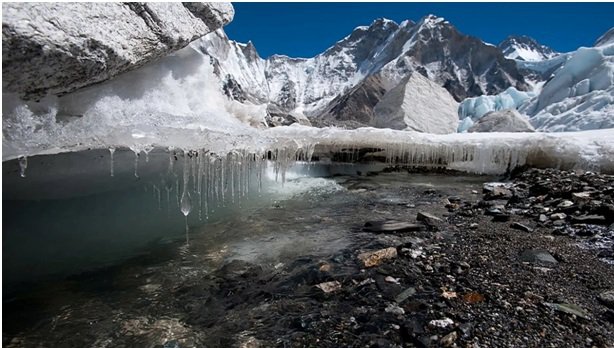
As the World Bank’s Global Economic Prospects report (June 2024) reveals a projected global growth of only 2.6% for 2024, the sobering reality for vulnerable countries like Nepal becomes starkly apparent. With nearly 60% of economies set to underperform compared to the 2010s average, Nepal faces a multi-faceted crises at the intersection of economic stagnation and climate vulnerability. Our reliance on agriculture, remittances, tourism, especially rural and Himalayan tourism, makes us acutely sensitive to global economic fluctuations and the devastating impacts of climate change.
The Fragile Economic Landscape: Public investment is crucial for catalyzing private investment and enhancing productivity across sectors. A mere 1% increase in public investment can yield a 1.6% boost in output, as noted by the World Bank. Yet, Nepal's recovery from COVID-19 remains sluggish, burdened by over-reliance on remittances and a beleaguered agricultural sector.The agricultural landscape paints a grim picture. The CBS/Agriculture Census 2078 (2021) shows that 55% of Nepali farmers face year-round food insecurity. This isn't just a statistic-it's a stark reality for millions if farners and families. Many farmers turn to alternative sources of income, often migrating to cities, while rural tourism-critical for local economies-struggles under the weight of climate-induced disasters. Natural calamities disrupt trekking seasons and accessibility to our world heritage sites, threatening the livelihoods of communities that depend on these resources.

Melting Himalayas in Nepal
Nepal's economic fabric is woven through various sectors, all of which are jeopardized by climate change.Agriculture plays a central role in the lives of approximately 3.999 million farming families, many of whom struggle to secure enough food for several months each year. This food insecurity disproportionately impacts women and children, deepening existing inequalities and perpetuating cycles of poverty. As climate change leads to unpredictable weather patterns and diminished agricultural yields, the vulnerability of these communities intensifies, making it increasingly difficult for them to achieve fod security and economic stability.Tourism is another vital sector significantly affected by climate change. The allure of Nepal's breathtaking rural and Himalayan landscapes draws tourists from around the globe, generating crucial revenue for local economies. However, erratic weather patterns, such as unseasonal rainfall and rising temperatures, coupled with environmental degradation, pose serious threats to this industry. These changes not only undermine the economic benefits derived from tourism but also jeopardize the cultural heritage that defines many rural communities, diminishing the unique experiences that attract visitors.
World Heritage Sites, including Sagarmatha National Park and Chitwan National Park, are facing existential threats from climate change. These treasured sites are not only vital for biodiversity conservation but also serve as important attractions for tourists. Climate change-induced challenges such as biodiversity loss, increased flooding, and landslides threaten conservation efforts and erode the natural beauty that draws visitors. The degradation of these sites compromises the livelihoods of local communities that depend on tourism and conservation activities, further exacerbating their vulnerability.

Call for Climate Finance, Fossil Free Future Nepal Event
The private and services sector, which encompasses a wide range of industries from hospitality to retail, heavily relies on the stability of agriculture and tourism. Disruptions in these foundational sectors can lead to job losses and stunted economic growth, creating a ripple effect throughout the economy. As agricultural productivity declines and tourism falters, the services sector faces increasing challenges, threatening the livelihoods of countless individuals and families. The interconnectedness of these sectors highlights the urgent need for a comprehensive approach to address the impacts of climate change, ensuring that all facets of Nepal's economy can thrive in a more resilient and sustainable future.
The Urgent Call for Climate Compensation: Following the conclusion of the UN General Assembly (UNGA) and the Summit of the Future in late September 2024, climate activists in Kathmandu have intensified demands for $500 billion in climate compensation for the world’s poorest nations. This plea is not just about justice but survival, as countries like Nepal, disproportionately affected by climate change, call for accountability from wealthy nations, the largest contributors to global emissions.
During his address to the UNGA on September 26, Prime Minister KP Sharma Oli emphasized the urgent need for climate compensation and tangible action from the global community. His participation at the Summit of the Future marked a critical moment for Nepal’s call for international solidarity. In a separate meeting with UN Secretary-General António Guterres, Oli discussed the pressing issue of climate impacts, including glacier melting, and Guterres pledged to advocate for increased climate finance for vulnerable nations like Nepal.

PM Oli Addressing Summit of the Future in New York
A Critical Lens on Nepal’s Path Toward a Just and Sustainable Future:Addressing the dual threats of economic stagnation and climate vulnerability requires Nepal to urgently strengthen its climate finance governance, which is currently marred by corruption and inefficiencies. While scaling up public investments in agriculture, food security, health, education, renewable energy, and sustainable tourism is essential, the risk remains that these funds may not reach marginalized communities effectively.Developing climate-resilient infrastructure is crucial, yet without an honest commitment to reform the existing governance system, these investments may fall prey to political manipulation. It is imperative to enhance not only transparency and accountability in climate finance but also to address the deeply entrenched corruption that undermines effective governance particularly in Nepal and global soutch as well.Mobilizing global support for adequate climate finance and debt relief is vital, but the critical question remains: Can Nepal ensure that these resources are distributed equitably and efficiently? Strengthening governance structures and committing to genuine reforms will be essential for transforming climate finance into a tool for meaningful change, ultimately benefiting the most vulnerable communities in Nepal.
A Shared Global Responsibility :Nepal's future hinges on global economic conditions and our capacity to adapt to climate change. While challenges are significant, strategic public investments and bold policy reforms can turn these into opportunities for resilience and growth.
In his recent address at the 'Summit of the Future' during the 79th United Nations General Assembly, Prime Minister KP Sharma Oli underscored the urgent need for industrialization and climate financing to combat poverty in Least Developed Countries (LDCs). He highlighted the adverse impacts of greenhouse gas emissions from developed nations and called for increased support to uplift vulnerable communities. Tragically, as he delivered this message, Nepal faced a devastating disaster that claimed hundreds of lives, inundated the capital city, and swept away thousands of homes.
As we confront these pressing challenges, the international community must act responsibly, ensuring that those most affected are not left behind. It is a moral imperative to work together for a sustainable future. The question remains: "Challenge is Clear, Are Wwe Ready to Act Now?"
(Parajuli, aHuman Right Defender, Development Activist and Practitioner working in RRN)













